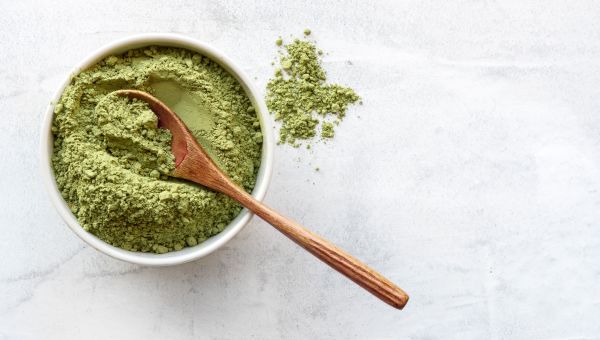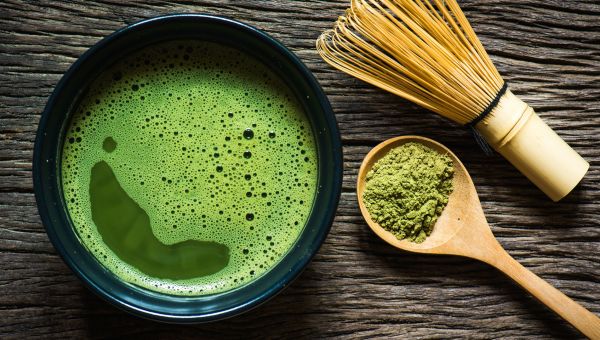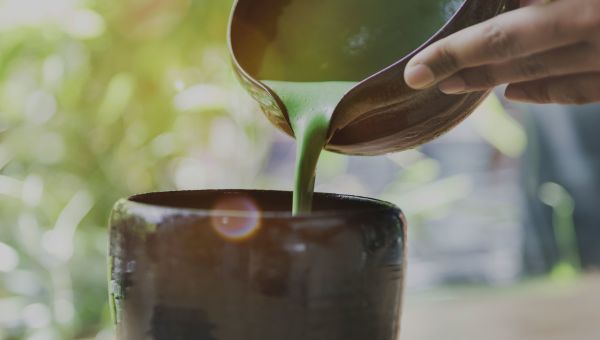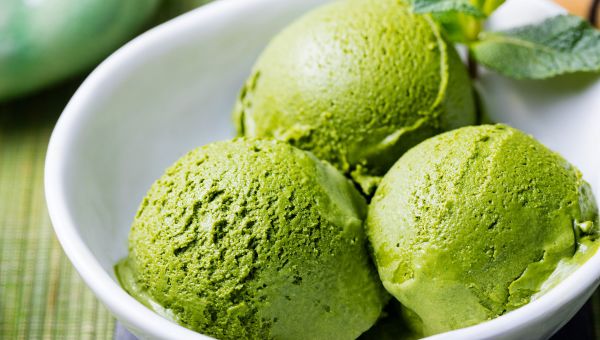Does matcha really live up to the hype?
Get the inside scoop on the health benefits of matcha, plus recipes to try at home.

If you’ve scrolled through social media lately, you’ve likely seen countless images of a jade-colored substance called matcha. A powder derived from green tea leaves and traditionally used in Japanese tea ceremonies, its popularity has boomed in the United States in recent years. That's largely due to its supposed health benefits, such as lowering the risk of heart… Show More
If you’ve scrolled through social media lately, you’ve likely seen countless images of a jade-colored substance called matcha. A powder derived from green tea leaves and traditionally used in Japanese tea ceremonies, its popularity has boomed in the United States in recent years. That's largely due to its supposed health benefits, such as lowering the risk of heart disease.
But is matcha really as good for you as some say? If so, how can you reap the perks?
Nutritionist Kelsey Tiller of Grand Strand Medical Center in Myrtle Beach, South Carolina, talks us through everything you ever wanted to know about the trendy tea.
Show Less
What is matcha?
Matcha is made when dried green tea leaves are ground into a fine powder and dissolved in liquid. Matcha fans say that you’ll get more nutrients from consuming matcha than you would from regular green tea. It’s more concentrated, since you’re consuming the whole tea leaves.
“Matcha is basically… Show More
Matcha is made when dried green tea leaves are ground into a fine powder and dissolved in liquid. Matcha fans say that you’ll get more nutrients from consuming matcha than you would from regular green tea. It’s more concentrated, since you’re consuming the whole tea leaves.
“Matcha is basically green tea on steroids,” says Tiller. “You get a higher return on the benefits when you switch out green tea for matcha powder.”
Show Less
What are the health benefits?
Matcha's health benefits are still up for debate. While few clinical studies have looked at the benefits of matcha, numerous reviews have explored the benefits of green tea. Even then, experts do not have enough information to reach concrete conclusions. The National Center for… Show More
Matcha's health benefits are still up for debate. While few clinical studies have looked at the benefits of matcha, numerous reviews have explored the benefits of green tea. Even then, experts do not have enough information to reach concrete conclusions. The National Center for Complementary and Integrative Health, however, does say:
- Green tea may increase mental alertness thanks to the caffeine content.
- Although studies are limited, green and black teas might help control blood pressure and cholesterol.
Cochrane, an independent organization known for its rigorous analyses, reviewed 11 randomized controlled trials on the subject and declared: “Limited evidence suggests that tea has favorable effects on cardiovascular disease risk factors.” Additional higher-quality studies are needed to confirm these findings.
The bottom line? Regular, moderate matcha consumption might improve your health, but the evidence is still scant.
Show Less
How to make matcha tea
You can add matcha powder to just about anything. Tiller says the best way to reap the health benefits is to consume it in its purest form, which you can do by making tea:
- Sift 1 to 2 tablespoons of green tea powder into a cup.
- Add 2 ounces of hot water.
- Froth with a bamboo matcha whisk in a zig- … Show More
You can add matcha powder to just about anything. Tiller says the best way to reap the health benefits is to consume it in its purest form, which you can do by making tea:
- Sift 1 to 2 tablespoons of green tea powder into a cup.
- Add 2 ounces of hot water.
- Froth with a bamboo matcha whisk in a zig-zag motion
Once it’s fully mixed, it’s ready to consume.
Show Less
More matcha recipes
In addition to making traditional matcha tea, it’s easy to infuse some of your favorite treats with matcha. Here are some ideas:
- Matcha smoothies: Try blending bananas, spinach, mango, and green tea powder together for a refreshing treat.
- Matcha lattes: Whisk together hot water and two … Show More
In addition to making traditional matcha tea, it’s easy to infuse some of your favorite treats with matcha. Here are some ideas:
- Matcha smoothies: Try blending bananas, spinach, mango, and green tea powder together for a refreshing treat.
- Matcha lattes: Whisk together hot water and two scoops of matcha powder in a mug. Then, whisk in any of your favorite flavorings, like cinnamon, vanilla bean paste, or raw honey. Heat your milk, froth it, then pour over the matcha mixture. If you prefer iced lattes, just use cold water and milk.
- Matcha “ice cream”: Blend three frozen bananas in a food processor. Slowly add 3 tablespoons of your favorite kind of milk—such as coconut or almond milk—and matcha powder. Blend it all together until the mixture has the consistency of soft-serve ice cream. If you’d like a thicker treat, freeze the finished product for an hour or more.
While you can control what goes into your homemade matcha treats, pay attention to the other ingredients in store-bought, matcha-flavored desserts and snacks. Just because something calls for matcha powder doesn’t always mean it’s healthy. “A doughnut with green tea icing is still a doughnut," says Tiller.
Show Less
How to choose the right matcha
If you’re going to give matcha a try, opt for products with the fewest ingredients, says Tiller. Choose vibrant green powders without added sweeteners or preservatives. You’ll also want to be sure that your matcha is high quality, since you’re consuming the whole leaf. So, look for Japanese matcha… Show More
If you’re going to give matcha a try, opt for products with the fewest ingredients, says Tiller. Choose vibrant green powders without added sweeteners or preservatives. You’ll also want to be sure that your matcha is high quality, since you’re consuming the whole leaf. So, look for Japanese matcha that’s steamed. These options usually contain fewer pollutants and are free of lead.
If you’re taking medications, especially blood thinners, or you’re pregnant or nursing, ask your healthcare provider if it’s safe to consume matcha. Certain drugs may have adverse side effects when mixed with matcha.
Also worth noting: Since matcha is highly concentrated and the production process is longer and more involved, it’s going to cost more than regular green tea. There are different price points, too, depending on the quality of the product.
Store matcha in a cool, dark place such as your refrigerator, or an air-tight container or bag. Once opened, it’s best used within two to three months.
Show Less
Matcha Source. “How to Prepare Matcha Green Tea?” 2021. Accessed May 14, 2021.
Breakaway Matcha. “How to Store Matcha.” 2021. Accessed May 14, 2021.
National Center for Complementary and Integrative Health. “Green Tea.” October 2020. Accessed May 14, 2021.
Tod Cooperman. “Green Tea Review: Supplements, Brewable, Matcha, and Bottled.” ConsumerLab.com. September 29, 2020.
National Cancer Institute. “Tea and Cancer Prevention.” November 17, 2010. Accessed May 14, 2021.
Cochrane. “Green tea for the prevention of cancer.” March 2, 2020. Accessed May 14, 2021.
Cochrane. “Green and black tea to prevent cardiovascular disease.” June 18, 2013. Accessed May 14, 2021.
National Institutes of Health Office of Dietary Supplements. “Dietary Supplements for Weight Loss.” March 29, 2021. Accessed May 14, 2021.
TM Jurgens, AM Whelan, et al. “Green tea for weight loss and weight maintenance in overweight or obese adults.” Cochrane Database of Systematic Reviews. December 12, 2012. Accessed May 14, 2021.
Jian-Min Yuan. “Cancer prevention by green tea: evidence from epidemiologic studies.” The American Journal of Clinical Nutrition, Volume 98, Issue 6, December 2013, Pages 1676S–1681S.
More On


video

article

slideshow


video


video
